
Mussolini during one of his rallies.
ZIMSEC O Level History Notes: Dictatorship in Europe: Dictatorship in Italy: Benito Mussolini: How Mussolini established total control in Italy between 1922 and 1930
Benito Mussolini took several steps to establish and consolidate his power in Italy.
- In 1923 he passed the Acerbo law which stipulated that a party which had the majority votes in national elections should be given 2/3 of the seats in parliament.
- In 1924 the Fascists party used violence and intimidation such as beating up and killing opponents to win elections.
- In 1925 he introduced press censorship and anti-Fascists newspapers and magazines were banned and the party controlled the media. Editors were replaced by Fascist supporters.
- Education in schools and universities was closely monitored.
- Teachers had to wear uniforms and new textbooks were written to glorify the Fascists system.
- In 1926 local government elections in towns and cities were banned and members were elected by National Party representatives.
- Persistant opponents of the regime were either exiled or murdered for example Glacemo Mathias and Giovanni Amendola were put to death by Fascist thugs. Another socialist leader Matteoti was killed.
- Although parliament still met by 1926 all important decisions were taken up by the Fascist Grand Council which always did as Mussolini told them.
- Mussolini adopted the title Il Duce and the slogan “Mussolini is always right.”
- Children were encouraged to criticize teachers who did not show enthusiasm for the party.
- Children and young people were forced to join the government Youth organization which indoctrinated them with fascist ideas and glories of war.
- Trade unions were controlled through the corporate state.
- Strikes and lockouts were banned.
- Mussolini also had a state police called OVRA.
- To compensate for their loss of freedom workers were assured of may benefits like free Sundays, annual holidays with pay, social security, sports and theater facilities, cheap tours and holidays.
- A new electoral law was passed in which the Fascist Grand Council chose and provided the electorate with a list of names to vote for.
To access more topics go to the History Notes page.







